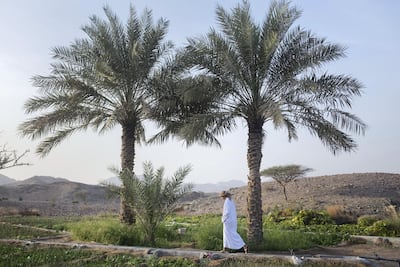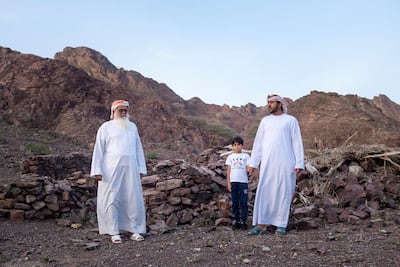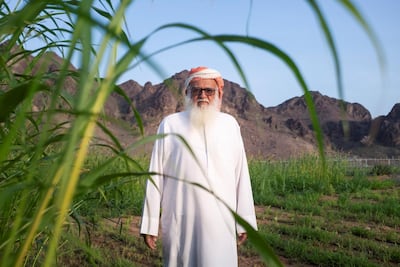Navigating through Ras Al Khaimah’s labyrinth of twisting mountain trails is a skill that comes naturally to the Mazroui tribe.
Tucked away in the town of Wadi Kub, local residents are accustomed to life in the surrounding hidden peaks.
During the working week, many who grew up in the area tend to head to neighbouring emirates closer to the coast to earn a living.
But at weekends, they return to spend time in the mountains and valley farms that they adore. And for some, the work does not stop.
“We never get lost in the mountains,” said Saif Al Mazroui, as he described how he and other tribesman had recently gathered a team of volunteers to help rescue weekend trekkers who were lost in the hills.
“This is our home and providing help to others is something that we are all willing to do.”
_________________
Read more:
Hiker Alex Underhill dies on on Ras Al Khaimah's Jebel Jais
Identities of UAE helicopter crash crew released
Paramedic who died in RAK helicopter crash 'was single father', as tributes paid to crew
Woman falls to death from RAK mountain
_________________
The courageous work of official mountain rescue teams in RAK was brought into focus in December following a tragic helicopter crash.
Four crewmen called to assist a man believed injured in the Jebel Jais area died when their aircraft plunged into the mountainside.

Pilots Saqr Saeed Mohamed Abdullah Al Yamahi and Hameed Mohamed Obaid Al Zaabi were both killed in the accident, along with navigator Jasim Abdullah Ali Tunaiji and first aid medic Mark Roxburgh.
Officials investigating the December 29 tragedy are looking into whether the Agusta 139 search and rescue helicopter hit the Jebel Jais zipline, a 2.8-kilometre long adrenaline ride for tourists.
The town of Wadi Kub sits nestled in the foothills of the Hajar mountains, some 40km due south of RAK city and east of nearby Adhen village.
Mr Al Mazroui, 40, an Emirati father of five, described how hundreds of trekkers headed to the area over the winter to soak up the majesty of the surrounding hills.
He said the trekking experience of tourists varied enormously, with many oblivious to the dangers of steep gullies and loose rocks. Injuries from slipping or falling were a common occurrence, he explained.
“Some of the mountain visitors are inexperienced and just don’t have the right equipment,” he said.
“Two years ago while checking on beehives in the mountain, I found a group of 10 people camping.
“One of them had been injured in a fall and they couldn’t call for help as the area didn’t have mobile phone coverage and they did not have a satellite phone.
“So I offered to help and took the man to the nearby medical centre for treatment.”

Since then, a number of tribesmen in the area have got together to form a group willing and able to assist walkers in difficulty.
They try to keep track of those adventuring into the mountains at weekends and use their navigation skills to guide lost groups.
The heat and strain of the mountains can be unforgiving and tragedies are not uncommon.
In September, an Indian woman in her thirties, described as a seasoned hiker, died after running out of water during an eight-hour trek on the Galila mountain in the Jebel Jais area.
And in June 2017, Briton Alex Underhill, 25, died after collapsing while hiking in the same area, in temperatures of up to 45°C.
“From time to time, we go walking in the mountains to check on our beehives and see if any walkers need our help,” Mr Al Mazroui said.
“People should be aware of the consequences if they come unprepared. They should be well-equipped with at least one in their group who has experience of mountains.
“But we’re happy to assist them if we can. Not everyone has our knowledge and we can use it for a good cause.”
Mr Al Mazroui’s father, Obaid Al Mazroui, 71, said his tribe had been living in the area going back hundreds of years.
He described how locals built homes made of rocks and covered by tree branches before modern housing methods reached the region.
“It’s a unique area which welcomes many visitors every year,” he said. “Water pours down the mountains from every direction in the winter and into the valley - that’s why they call it Wadi Kub. Kub is the Arabic word for cup.”
“Many of us here are farmers and beekeepers,” said his son. “It’s a profession we inherited from our ancestors and we work hard at preserving it for the next generation.
“During weekends you’ll find us either in the farms near the valley or at the beehives in the mountains.
“We know all the tracks by heart as we grew up playing there. We’re used to the craggy terrain and can’t get enough of its beauty. You can always find us in the mountains in our free time.”


